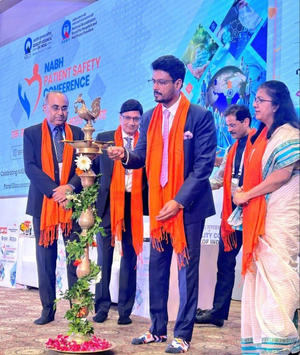New Delhi: Patient safety must be a global objective and it transcends the responsibilities of healthcare providers, said Union Minister of Health and Family Welfare JP Nadda on World Patient Safety Day on Tuesday.
He was speaking at the National Accreditation Board for Hospitals and Healthcare Providers (NABH) Patient Safety Conference (NPSC 2024) organised by the Quality Council of India (QCI), an autonomous body set up by the Ministry of Commerce and Industry.
“Patient Safety transcends the responsibilities of healthcare providers; it should be a global objective. Our systems must be designed with the utmost priority for patient safety,” said Nadda, addressing the gathering via a video message.
The event, aimed at advancing patient safety and healthcare quality, also launched key initiatives like E-Mitra Chatbot — a 24/7 AI-powered tool on WhatsApp and the NABH website to streamline accreditation processes; Mitra physical centres to tailor support for small hospitals in Tier 2, Tier 3 cities, and rural areas to promote NABH standards and entry-level certifications.
The NABH also introduced e-skilling modules to help in Interactive training for healthcare management.
“The NABH Patient Safety Conference (NPSC 2024) aligns with the vision of ‘One Earth, One Health,’ championed by our Prime Minister Narendra Modi. The initiatives like the E-Mitra Chatbot, Mitra physical centres, and e-skilling modules, etc, introduced at the conference today will make Indian healthcare more efficient, transparent, and patient-centric,” said Jaxay Shah, QCI Chairperson.
“These efforts will play a pivotal role in further strengthening patient safety and elevating the quality of care, especially at the grassroots level in tier 2 and tier 3 cities and villages. Together, we are ensuring that quality healthcare becomes a reality for all, one hospital at a time,” he added.
The World Patient Safety Day is observed annually on September 17. The theme for 2024 is focused on improving diagnosis for patient safety, using the slogan “Get it right, make it safe!” It highlights that correct and timely diagnosis is critical in improving patient safety.
–IANS


Comments are closed.